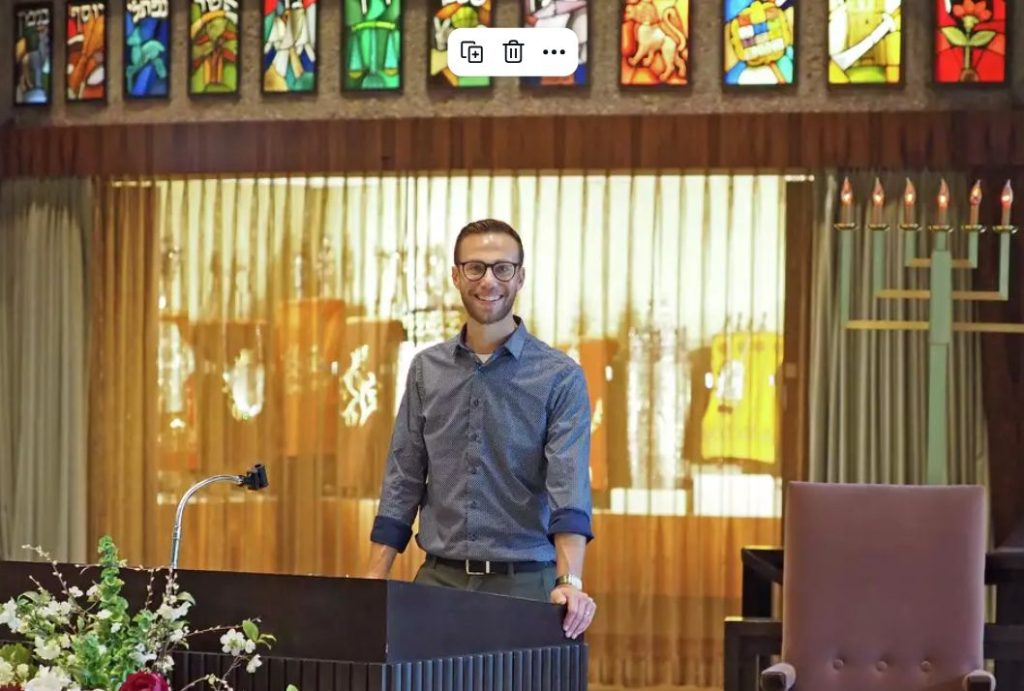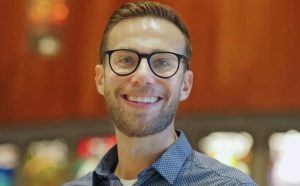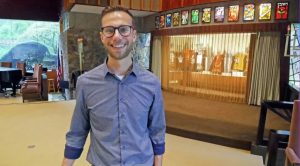New rabbi at Stamford’s Temple Beth El wants to open doors to the community
By Brianna Gurciullo, Staff Writer
Photography by Christian Abraham/Hearst Connecticut Media
Stamford Advocate spotlights Rabbi Knopf, the new senior rabbi at Temple Beth El as he embraces the vision of a congregation as a welcoming, open space and aims to build on the legacy of his predecessor.
 Rabbi Michael Knopf said he thinks of a Jewish congregation as a house with no walls and open doors.
Rabbi Michael Knopf said he thinks of a Jewish congregation as a house with no walls and open doors.
Knopf, who recently became the senior rabbi at Temple Beth El in Stamford, said the symbolism is similar to that of the chuppah, the canopy used in Jewish weddings, which represents the household a newly married couple will build together.
“It is open on all sides, so that it’s a home that brings in people from outside, that provides … comfort and warmth to those who are in need and also compels the couple to look outside, beyond their immediate sphere, to see what strength … their relationship can bring to the wider world,” Knopf said.
One feature he said he loves about Temple Beth El — a Conservative synagogue in Stamford’s Westover neighborhood with a congregation of about 450 families — is the windows along the sides of the sanctuary.
“This is really a congregation of windows and not walls,” Knopf said. “I think that tapping into that spirit, those values, that orientation and dialing it up as best I can … is really exciting to me.”
Knopf, 41, began his new role in July, taking over for Rabbi Joshua Hammerman, who led the congregation for more than 30 years. Hammerman now serves as rabbi emeritus. “It’s intimidating,” Knopf said about succeeding Hammerman.
“My hope is, first of all, to … draw on his wisdom and his expertise and his relationships, and to build on his legacy, to celebrate what he’s accomplished, and to take it the next step forward.”
Before his move to Stamford, Knopf spent about a decade as the rabbi of Temple Beth-El in Richmond, Va. He said he and his wife, Adira, were looking to live in a place that was closer to family and friends and had a larger Jewish community and more educational opportunities for their three children.
Temple Beth El in Stamford “felt like a really good fit,” he said.
 As he begins his tenure as senior rabbi, Knopf said he believes people are looking for connection during a “lonely time.” It’s important for the synagogue to be a place with “deep and meaningful webs of relationships,” he said.
As he begins his tenure as senior rabbi, Knopf said he believes people are looking for connection during a “lonely time.” It’s important for the synagogue to be a place with “deep and meaningful webs of relationships,” he said.
Knopf said he thinks members of the Jewish community are also “anxious about the state of the world and the place of Jewish people in it” and are seeking “a place that advocates for the full inclusion and equality of Jewish people in our larger civic community.”
The Anti-Defamation League found that more than 180 antisemitic incidents took place across Connecticut last year — a 170 percent increase from 2022. In Stamford, white supremacist flyers were left in driveways in parts of the city in 2023, and antisemitic vandalism has been found at the Academy of Information Technology & Engineering both last year and this year. In recent weeks, state and city Rep. Anabel Figueroa, has come under fire for remarks she made about an opponent who is Jewish.
As a Jewish leader, Knopf said he tries to offer a space where Jews can feel safe and proud and at the same time encouraged to build relationships in the wider community.
“It’s easier to hate people that you don’t know or don’t know much about. … Sometimes we’ll say that nature abhors a vacuum, but antisemitism loves one,” he said. “So I think that … where people are connected, where people know each other in community, where there’s relationships, it’s harder to hate.
“I think that the tendency sometimes in Jewish communities is to circle the wagons in moments like these, but I think that that’s in some ways counterproductive,” Knopf continued. “And so the orientation should be, ‘We’ve got to be cautious and be proud of who we are, love who we are, celebrate who we are, but also to not close ourselves in.’”
He said members of Temple Beth El are also concerned about ensuring that the congregation is “vital and vibrant and relevant for the subsequent generations.” The synagogue recently started to allow individuals and families under 40 years old to choose how much they pay in membership dues. (Learn more here!)
An Atlanta native, Knopf said he grew up in a family that was involved in the Jewish community but not particularly religious. He and his siblings went to an Orthodox Jewish day school, and as a student, he said he often pushed back in the classroom.
“Depending on your perspective on things, I was either a very inquisitive kid or a pain in the ass,” Knopf said. “I found myself really challenging, questioning a lot and not really liking the responses I was getting. And it felt to me, when I was in that setting, that Judaism seemed really small, that it was focused on very kind of parochial Jewish questions and Jewish concerns.”
After he “begged” his parents not to force him to go to a Jewish high school, he went to a non-Jewish school, but he said he struggled in that environment as well.
“I found myself kind of lost … looking for my place, looking for my people,” Knopf said. He said he found them when he joined a Jewish youth group, whose director became a mentor. The group had an approach that was more “open and involved and engaged in the world,” Knopf said.
“I found a way into Judaism that was simultaneously serious about Judaism and serious about the world and also serious about the conversation between those two things — the way that what’s happening in the world should impact the way you think about Judaism, and your Judaism should impact the way you’re thinking about the world,” he said.
As he got more involved in the group, he said he discovered that he “really loved helping to build community and facilitate Jewish experiences” among his peers. He considered becoming a youth director, but he said his father advised him to think about rabbinical school because he thought it could give him more career options.
 After attending Columbia University in New York City, where he studied 19th-century American history, he spent a year at the Conservative Yeshiva in Israel, where he met his future wife. He then went to rabbinical school in Los Angeles before becoming an assistant rabbi at Har Zion Temple in Penn Valley, Pa. Three years later, he became the rabbi of Temple Beth-El in Richmond.
After attending Columbia University in New York City, where he studied 19th-century American history, he spent a year at the Conservative Yeshiva in Israel, where he met his future wife. He then went to rabbinical school in Los Angeles before becoming an assistant rabbi at Har Zion Temple in Penn Valley, Pa. Three years later, he became the rabbi of Temple Beth-El in Richmond.
Now, Knopf said he is focusing on becoming “embedded” in his new community. He said he hopes to empower members of the congregation to “take ownership over their own Jewish stories and their own Jewish lives” as well as partner with other faith communities to “make a real, meaningful difference.”
More broadly, “I think that the trajectory of the Jewish tradition is to motivate us and inspire us and guide us to repair the world,” Knopf said. “In Hebrew, we call it ‘Tikkun Olam,’ but it translates more or less to ‘repair the world,’ meaning to make the world more loving, more inclusive, more just, more equitable and more peaceful — ultimately, to make it totally those things.”
If you have questions or would like to talk to Rabbi Knopf directly, you can schedule time to meet with him, whether virtually or in person, through his Calendly. If you don’t see anything that works for you, feel free to email him with some options that do @ rabbiknopf@tbe.org. Click here to subscribe to Temple Beth El News!




